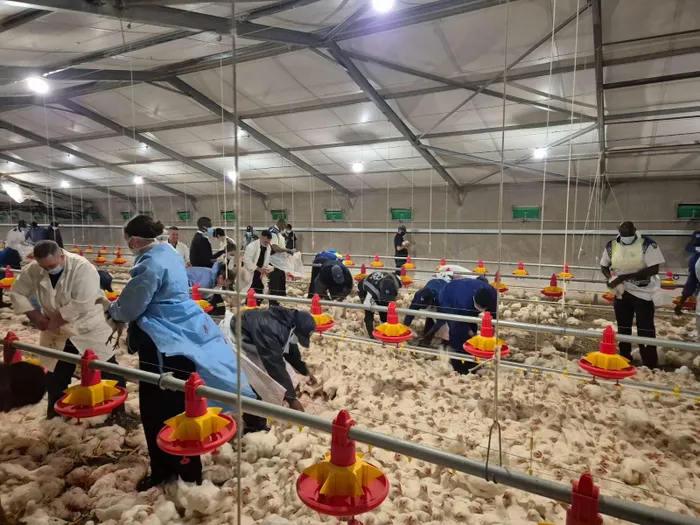
The National Council of SPCAs (NSPCA) has obtained an urgent court order against Daybreak Foods, compelling the company to cease inhumane culling practices and provide adequate care for hundreds of thousands of breeder birds at risk of starvation and suffering.
Image: NSPCA
Banele Ginidza
Workers at Daybreak Foods' farms have laid down a series of demands that centre on the immediate termination of Chief People Officer Tshepo Yvonne Mosadi's contract, alongside a comprehensive overhaul of the company's board and management structure.
This demand comes as the Public Investment Corporation (PIC) on Friday injected a further R74 million into the embattled farming establishment in a bid to pay for outstanding salaries for April, buy chicken feed supplies, and for specific essential operational expenses.
The R74m, which is part of the R250m financial support requested by Daybreak in February, was initially earmarked for capital expenditure.
On Friday, the Daybreak Workers Union issued a letter detailing their demands and expressed deep concerns over past management practices.
"To avoid suffering the same fate, we are eliminating that risk, and avoiding the new cash injection falling into the same hands that have already proven to be incapable and incompetent to run and manage the establishment," read the letter, which was seen by Business Report.
Workers also voiced multiple grievances, including the accounting methods related to overtime, delays in payment of May salaries, and inadequate provisions for Personal Protective Clothing (PPE). Further, there were calls for revisions in production pauses to ensure better working conditions, alongside critical changes to the slaughter culture that could impact both worker safety and animal welfare.
Mosadi, a nominee for the Chief Human Resources Officer Awards in 2023, has faced backlash, accused by workers of being disconnected from their plight.
Sources indicate that the PIC, which recently authorised a R100 million emergency fund known as the "Sunday Account," aims to address the immediate liquidity needs that have left workers and the company in a precarious situation.
This emergency fund, confirmed on Thursday and Friday, is a part of the overall financial package being arranged by the PIC.
Though the PIC on Friday announced the decision to provide immediate financial support to Daybreak Foods, it reiterated that the board and management of Daybreak Foods remained responsible and accountable for the company’s operations and finances.
"The PIC is strengthening the board and assisting it to strengthen management to help to bring stability to the company and to resume normal operations," said the PIC.
"Daybreak’s leadership is tasked to develop and implement a turnaround strategy and a credible turnaround plan to ensure long- term sustainability and growth, including how the company intends to avert job losses and safeguard the welfare of the livestock."
Meanwhile, the National Council of SPCAs (NSPCA) on Saturday obtained an urgent court order against Daybreak Foods, compelling the company to cease inhumane culling practices and provide adequate care for hundreds of thousands of breeder birds at risk of starvation and suffering.
This followed a catastrophic welfare emergency currently unfolding at two of Daybreak’s breeder farms in Bela-Bela and Mookgopong. An estimated 594 000 birds are at immediate risk of starvation, suffering from cannibalism, injuries, and prolonged neglect due to insufficient feeding and inhumane culling practices.
According to a whistleblower report, the upheaval at the company stems from Daybreak's attempt to remove the PIC as mandate holder and appoint a private entity specialising in investors mandates.
The report revealed that the PIC acts only as an investor mandate holder on behalf of these shareholders, not as a direct shareholder with the Government Employees Pension Fund (GEPF), Unemployment Insurance Fund (UIF), and the Compensation Fund (CF), each holding 33.3% of the entity.
The complications have disrupted normal governance, with no Annual General Meetings (AGMs) convened since 2021 and a shocking turnover of four CEOs in merely four years — a clear reflection of governance failures.
A whistleblower report has drawn attention to inadequate board oversight, failure to exercise diligent oversight of executive decisions, absence of consequence management enabled unchecked misconduct, deficiencies in fiscal management created vulnerabilities for mismanagement.
Lack of operational and industry-specific competence and disconnected vision between the board and executive management are believed to have allowed the bypassing of governance frameworks.
Amidst this chaos, the Congress of South African Trade Unions (Cosatu) has also weighed in, highlighting the need for urgent financial distributions to workers while addressing governance concerns.
"If the PIC intervention doesn't work, we would need to assess what the next steps should be. We cannot afford for this company to be a perennial crime scene," Cosatu parliamentary spokesperson, Mathew Parks said.
BUSINESS REPORT